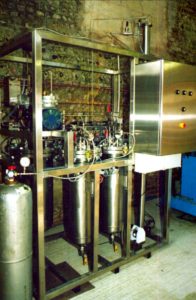
The Advanced Phytonics Extraction technology is an alternative to supercritical carbon dioxide and organic solvents extractions.
It is difficult to choose an extraction system if you’re unsure of what you need. Fortunately, compound extraction is not only science, but a certain art lies with it as well.
Extracting compounds for specialty chemicals, pharmaceutical or botanical preparations can be straight forward when you implement an Advanced Phytonics Extraction System. Discover the advantages that the Advanced Phytonic Extraction Systems offer over supercritical carbon dioxide and organic solvents, and why this extraction process is a great solution for your operation.
The advantages of the Advanced Phytonics Extraction Technology have over supercritical CO2 and organic solvents are:
● More environmentally friendly
● Ability to modify the solvent to improve extraction capabilities
● Lower capital cost
● Much safer operation – operation at lower pressures and temperatures
● Non-flammable
One of the main benefits of using the Advanced Phytonics Extraction Systems is that they are much more environmentally friendly than their counterparts. Phytonic Extraction Systems use non-chlorinated fluorohydrocarbons, which are commonly used as environmentally friendly refrigerants because they are much easier to use than their organic solvents. Non-chlorinated fluorohydrocarbons are also non-flammable, inert, non-corrosive, non-toxic and highly selective, making them very safe to work with.
An additional advantage to be aware of is that refrigerants are very easily modified. By adding cosolvents to the refrigerants, they can be modified to fit virtually every need.
In comparison to supercritical carbon dioxide extraction (SCC02), tetrafluoroethane requires much less expensive equipment for the extraction process to be processed. For instance, instead of needing high pressure ASME vessels capable of handling pressures more than 1500 psig, you can lower your vessels design pressure down to as low as 100 psig. Tetrafluoroethane can liquefy at 72.5 psig.
Lower working pressures means lower costs and drastically improved plant safety. Also, when tetrafluoroethane is exposed to water it does not form acids, which is a concern when dealing with SCCO2.
Phone: 310-792-5870 Email: rcca@rccostello.com
Website: rccostello.com